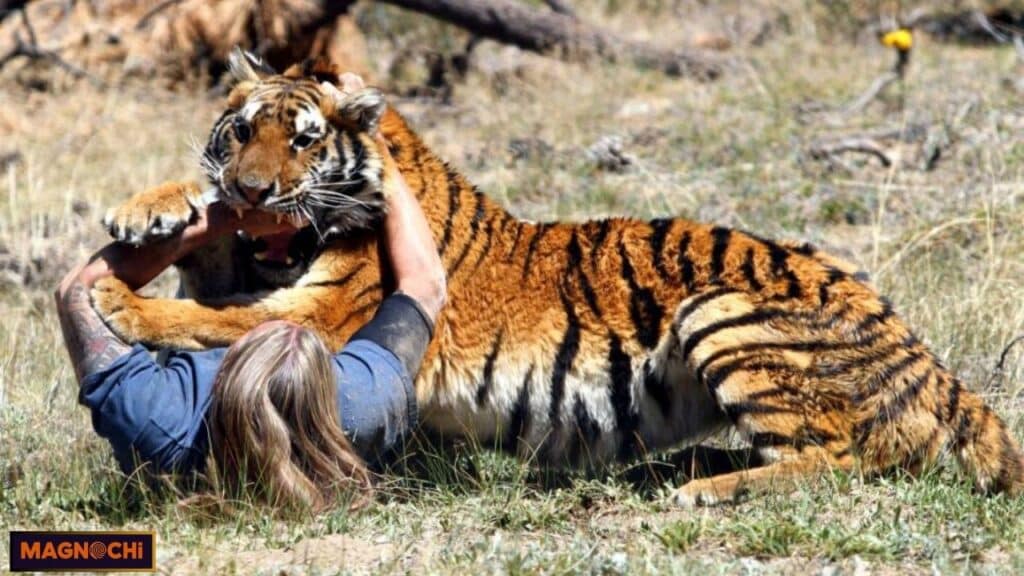Do Lions Attack Humans? Lions, the kings of the jungle, have fascinated humans for centuries. Their sheer power, majesty, and hunting prowess make them a symbol of strength.
Yet, for many, the idea of encountering a lion stirs fear, leading to one burning question: Do lions attack humans?
Lions are often viewed as fierce predators, capable of inflicting serious harm or even killing. But are lion attacks on humans as common or as deadly as we often hear in stories and sensationalized reports?
In this article, we will explore the truth behind lion attacks on humans, delve into historical incidents, examine the reasons behind such attacks, and explore how we can live alongside these magnificent creatures while minimizing risks.
Let’s separate fact from fiction and uncover the reality of human-lion conflicts.
What Are Lions?
To truly understand why and when lions might attack humans, we first need to examine who lions are. Lions (Panthera leo) are apex predators, meaning they sit at the top of the food chain in their ecosystems. [Do Lions Attack Humans?]
Their physical strength, sharp claws, and powerful jaws make them formidable hunters. Lions are social animals, unlike their solitary counterparts, such as tigers or leopards, living in prides that can consist of several females, their offspring, and a few males.
Physical Characteristics
Lions are easily recognizable by their muscular build and mane (in males), which sets them apart from other big cats.
Their size varies, but adult males typically weigh between 330 to 500 pounds, while females weigh around 260 to 400 pounds.
This strength is vital for hunting large prey such as wildebeest, zebras, and buffalo, which are common in their natural habitats.
- Mane: The male lion’s mane is not just for display; it serves as protection during fights with other males and may also signal the lion’s health and virility.
- Speed and Agility: While not as fast as cheetahs, lions are surprisingly fast runners, reaching speeds of up to 50 miles per hour in short bursts, which helps them catch prey.
- Communication: Lions communicate through roars, which can be heard up to five miles away. This serves as both a territorial signal and a means to locate pride members.
Habitat and Distribution
Lions primarily live in sub-Saharan Africa, with small populations also found in India’s Gir Forest, home to the Asiatic lion.
These majestic creatures thrive in savannas, grasslands, and open woodlands, environments that support their hunting and social behaviors.
However, as human populations grow and habitat loss accelerates, lions are increasingly forced into closer proximity with people, heightening the chances of human-lion conflict.

Do Lions Attack Humans?
It’s essential to address the question head-on: Do lions attack humans? While the simple answer is “no,” the reality is more nuanced.
Lions are not naturally inclined to hunt humans, and attacks are extremely rare. In fact, lions generally avoid humans and are more likely to attack when they feel threatened or when food is scarce.
Reasons Behind Lion Attacks on Humans
Lions do not typically see humans as prey. However, several factors can drive them to attack:
- Food Scarcity and Prey Availability: Lions are carnivores that hunt large herbivores. However, during times of drought or when their natural prey is depleted due to disease, overhunting, or habitat loss, lions may become more desperate. They may enter human settlements in search of easier food sources, such as livestock or even human beings.
- Territorial Defense: Lions are territorial animals. They are protective of their space and the resources within it, including food and mates. If a human wanders into their territory, the lion may perceive them as a threat and attack to defend its space.
- Injury or Illness: Just like any predator, lions that are injured or suffering from illness (such as disease or dental issues) may become more aggressive. In such cases, the lion might be unable to hunt its usual prey effectively and might turn to easier options, including humans.
- Mistaken Identity: At times, a lion might mistake a human for one of its regular prey species, especially at night or in low visibility situations. For example, a lion could confuse a person with a wildebeest or another large herbivore.
- Human Provocation: In some cases, humans provoke attacks unintentionally or deliberately. Approaching lions too closely, especially in their territory, can lead to an attack. Likewise, feeding or trying to domesticate lions can trigger their predatory instincts.
- Scavenging Behavior: Lions are opportunistic feeders, and they will scavenge from other predators. If lions are hungry or injured, they may scavenge from nearby human settlements, particularly when food scarcity or drought forces them to venture into inhabited areas.
Historical Incidents of Lion Attacks
While lion attacks on humans are rare today, historical events have contributed to the myth that lions are frequent threats to humans.
These incidents provide valuable insights into why lions attack and help us understand how to avoid similar situations. [Do Lions Attack Humans?]
The Man-Eaters of Tsavo (1898)
Perhaps the most infamous incident of lion attacks in history occurred in 1898 when two lions in Tsavo, Kenya, became known as the Man-Eaters of Tsavo.
These lions killed and ate a large number of workers who were building a bridge for the Uganda Railway. It is estimated that the lions killed over 30 workers, although some estimates suggest the total could be much higher.
Several factors may have contributed to this unusual behavior:
- Scarcity of food: A lack of prey, due to a drought, may have pushed the lions to hunt humans.
- Injury or disease: The lions may have been injured or suffering from a disease that made it difficult for them to hunt normal prey.
- Construction site: The railway workers, living in makeshift camps, were vulnerable, providing an easy food source for the lions.
The Man-Eaters of Tsavo were eventually killed, and their skins were displayed as trophies.
They are now housed at the Field Museum in Chicago, where they continue to intrigue researchers and visitors alike.
Their story is a stark reminder that lion attacks, while rare, can happen under extreme circumstances. [Do Lions Attack Humans?]
Other Notable Incidents
- Kenya: In the 1990s, lions in parts of Kenya, particularly in Amboseli National Park, started attacking livestock due to human encroachment into lion habitats. Lions targeting livestock often resulted in retaliatory killings by farmers, escalating the human-lion conflict.
- India: In Gir Forest, home to the Asiatic lion, occasional attacks on humans are reported, but these are usually linked to human settlements encroaching into lion territories. As human populations expand, lions often come into contact with people, leading to attacks on livestock or, in rare cases, humans.

Frequency of Lion Attacks Today: Are They Increasing?
Given that lions are apex predators, their interactions with humans are typically driven by specific circumstances.
While many believe that lion attacks are becoming more frequent, the reality is that attacks remain relatively rare.
According to global statistics, less than 100 fatal lion attacks occur each year worldwide, which, given the millions of people living in or near lion habitats, is quite low.
However, human-wildlife conflict is becoming a more significant issue as human populations continue to encroach on lion habitats.
In particular, in countries like Tanzania, Kenya, and Mozambique, the rise in deforestation, urbanization, and poaching has made human-lion encounters more frequent.
Factors Contributing to the Perception of Increasing Attacks:
- Human population growth: As more people move into areas close to lion habitats, the likelihood of human-lion interactions increases.
- Habitat loss: Deforestation and urban expansion push lions into smaller, more fragmented habitats, which increases the chances of encountering humans.
- Food scarcity: Droughts and other environmental factors can lead to prey depletion, forcing lions into human settlements in search of food.
- Poaching: As lions are hunted for their pelts or as part of illegal wildlife trade, their behavior may change, increasing the likelihood of attacks.
Geographical Hotspots for Lion Attacks
Certain regions are more prone to lion attacks due to a combination of factors such as habitat loss, human settlements, and food scarcity.
Key Hotspots for Lion Attacks:
- Kenya: Areas such as Tsavo National Park, Amboseli National Park, and Maasai Mara are known for their high lion populations and incidents of human-lion conflict, especially during the dry season.
- Tanzania: The Serengeti and Ngorongoro Crater are both iconic lion habitats. However, the expansion of agricultural activities and human settlements around these areas has led to an increase in lion-human encounters.
- Mozambique: As in Tanzania and Kenya, lions in Mozambique’s Gorongosa National Park have been known to venture into villages and livestock farms in search of food.
Environmental Factors That Increase Risk:
- Dry season: During periods of drought, natural prey becomes scarce, forcing lions to hunt outside their usual territories.
- Livestock protection: Farmers who do not use lion-proof bomas to protect their livestock are at higher risk of lion attacks.
Comparison with Other Big Cat Attacks: Lions vs. Tigers, Leopards, and Cheetahs
When considering the threat posed by big cats, it’s essential to compare lions with other large predators such as tigers, leopards, and cheetahs.
- Tigers: Tigers are more likely to attack humans than lions, especially in areas like India and Bangladesh, where tiger attacks on humans have been more frequent due to competition for resources and territory.
- Leopards: Leopards are solitary hunters that are more stealthy than lions. They are also known to attack humans, especially in urban areas or regions where they face habitat loss.
- Cheetahs: Unlike lions, cheetahs rarely pose a threat to humans. Their diet mainly consists of smaller prey, and they are much more likely to avoid human contact than lions or tigers.
Lions, with their predatory behavior, generally fall in between these species, with a higher likelihood of human encounters than cheetahs but fewer attacks than tigers and leopards.
Reasons Why Lions Attack Humans
Despite their fearsome reputation, lions don’t often attack humans without a reason. Understanding the circumstances behind lion attacks can shed light on why these majestic creatures may turn on people.
It’s important to note that lions do not see humans as a primary food source, but instead, attacks usually occur due to specific factors that drive them to act aggressively. [Do Lions Attack Humans?]
Food Scarcity and Environmental Stress
One of the most common reasons for lion attacks on humans is food scarcity. Lions are primarily carnivores that hunt large herbivores such as zebras, antelopes, and wildebeests.
However, when drought or climate change reduces the availability of prey, lions may be forced to venture closer to human settlements in search of food. This is especially common during the dry season, when prey animals migrate or become scarce.
In some cases, lions may turn to livestock, such as cattle, sheep, or goats, which are more readily available near human communities.
When lions become accustomed to eating livestock, they may start to view humans as an easy target, particularly if they are desperate or if the lions are old or injured and cannot hunt typical prey.
Territorial Instincts and Defense
Lions are fiercely territorial animals, especially the males who patrol and defend their pride’s territory. [Do Lions Attack Humans?]
Human intrusion into these territories, whether intentional or accidental, can be seen as a threat to the lion’s home range.
If a person enters a lion’s territory, the lion may feel compelled to defend itself, its pride, or its resources by attacking.
This behavior is more likely when a lion feels cornered or when it is protecting its cubs or its territorial boundaries.
Lions are known to become especially aggressive when they feel their young are threatened.
Injuries and Illnesses
Just like any wild animal, lions that are injured or sick may become more aggressive. An injured lion may struggle to hunt its usual prey and may become desperate for food.
Similarly, lions suffering from diseases like canine distemper, tuberculosis, or rabies can display altered behavior, including increased aggression towards humans.
These changes may increase the likelihood of attacks, especially if the lions are unable to hunt or fend for themselves in their usual manner.
Mistaken Identity and Predatory Behavior
Lions typically hunt large herbivores such as wildebeests, zebras, and buffaloes, which share many physical characteristics with humans.
In certain circumstances, especially in low light conditions or when the lion is hungry, a lion may mistake a human for one of its normal prey items.
Humans, particularly those who are walking or running, might inadvertently trigger a lion’s predatory instincts.
While this may seem unlikely, it’s important to understand that lions are skilled predators with highly developed senses of sight and smell.
They are also opportunistic hunters, and if they see an easy target, they might act without hesitation. [Do Lions Attack Humans?]

How Dangerous Are Lion Attacks?
Lions are powerful predators capable of inflicting severe harm. Their sharp claws, strong jaws, and immense physical strength make them one of the deadliest animals on the planet.
So how dangerous are lion attacks on humans?
The Physical Impact of a Lion Attack
A lion’s bite is capable of crushing bone and ripping through muscle. In an attack, lions often target the neck, throat, or back of their prey to disable them quickly.
Lions can also use their claws to swipe at their victims, causing deep wounds and tearing flesh.
Here are a few facts about the dangerous nature of a lion’s attack:
- Lions can break bones with their powerful jaws.
- Lion claws are sharp and can cause extensive tissue damage.
- A lion’s bite force is between 650 and 1,000 pounds per square inch (psi), far stronger than that of most other big cats.
- Lions are capable of running at speeds of up to 50 miles per hour, so they can close the distance quickly and overpower a person with minimal effort.
Fatalities and Injuries from Lion Attacks
While attacks are relatively rare, the consequences of a lion strike can be severe, and fatalities are not uncommon.
Lions typically hunt in the wild, where they target large prey. When a lion attacks a human, it is often out of necessity, territorial aggression, or self-defense.
Lion attacks can result in fatalities, though such cases are statistically low. Reports suggest that in certain parts of Africa, about 50-100 people are killed by lions each year. [Do Lions Attack Humans?]
However, these numbers are only a fraction of the total number of people living in areas where lions roam, which makes lion attacks an uncommon but very real threat in some regions.
How to Avoid Lion Attacks: Key Safety Measures
While the likelihood of encountering a lion in the wild is low, it’s crucial to know what to do if you find yourself in a lion’s presence.
Understanding basic safety measures and how to avoid lion attacks can greatly reduce the risk of injury or death.
Staying Safe on Safari and in Lion Habitats
If you’re in a lion habitat, such as on safari or living near a lion’s territory, there are several ways to minimize the chances of an attack:
- Stay in Vehicles: When on safari or visiting a national park, stay in a vehicle at all times. Lions view vehicles as an obstacle, and staying inside a car or jeep keeps you out of their reach.
- Avoid Nighttime Walks: Lions are often most active at night. Walking after dark in lion territory increases your risk, as lions may not see you as a threat and might approach in search of food. Stick to daylight hours for any outdoor activities.
- Make Noise: Lions are more likely to avoid humans if they hear them coming. Make noise while walking through areas where lions might be present, and avoid surprising them.
- Respect Lion Territories: If you’re traveling in lion territory, be sure to respect boundaries. Never venture too close to lion prides or into areas marked by lion activity.
- Travel in Groups: Lions are less likely to attack groups of people. Traveling in groups, especially with a guide who understands lion behavior, will give you an added layer of safety.
Protecting Livestock from Lions
In rural areas where human-lion conflicts are more common, protecting livestock is essential. Lions are more likely to attack livestock, which can draw them into human settlements. Here are some effective ways to protect livestock from lions:
- Lion-proof Bomas: These are strong enclosures built to protect livestock at night. Bomas are typically made from thorny bushes or metal fencing, which can keep lions out.
- Use of Guard Dogs: Dogs can help scare off lions or alert farmers to their presence.
- Livestock Fencing: Strong, high fences prevent lions from accessing livestock and prevent them from entering human settlements.

Are Lion Attacks on Humans Increasing?
While lion attacks are rare, there is concern that human-lion conflict may be increasing in some areas. [Do Lions Attack Humans?]
The reasons for this include habitat loss, climate change, deforestation, and human encroachment on lion territories.
As lions are forced into smaller spaces and are pushed into closer proximity to human settlements, the likelihood of conflict increases.
Factors Contributing to the Rise in Attacks:
- Urbanization and Population Growth: As human populations expand, more people are living in areas close to lion habitats. This increases the chances of human-lion encounters.
- Environmental Changes: Drought and other climate changes can lead to prey scarcity, prompting lions to hunt outside their usual territories.
- Poaching and Habitat Loss: Poaching for lion pelts and illegal trade in lion parts has reduced lion populations in some areas. As their habitat shrinks, lions may move closer to human settlements in search of food.
Addressing the Issue Through Conservation
Conservation efforts are crucial in preventing human-lion conflicts from escalating. Habitat restoration, anti-poaching initiatives, and community outreach programs that teach local people about lion behavior can go a long way in minimizing attacks.
Efforts to restore and protect natural habitats can ensure that lions remain in areas where they can thrive without posing a significant threat to human populations.
Final Verdict
Lion attacks on humans are rare, and lions generally avoid human contact. However, under specific circumstances such as food scarcity, territorial defense, or disease lions may attack. [Do Lions Attack Humans?]
By respecting lions’ natural habitats, minimizing human-lion encounters, and implementing proper safety measures, we can coexist with these majestic creatures while ensuring both their conservation and human safety.
FAQs
Can Lions Be Friendly to Humans?
While lions are not domesticated animals and should never be approached, some individuals have formed bonds with lions in captivity. However, these are rare cases, and lions are wild animals with unpredictable behavior. It’s always best to respect them from a distance.
What Should You Do If You Encounter a Lion in the Wild?
If you encounter a lion, remain calm. Do not run, as this may trigger a predatory response. Slowly back away while facing the lion, and make yourself look larger by raising your arms or holding a jacket. Never turn your back on the lion.
Are Lions More Dangerous Than Other Big Cats?
While lions are dangerous predators, they are not inherently more dangerous than other big cats, like tigers or leopards. However, lions’ social structure and territorial nature mean they can pose a greater risk when provoked.
How Do Conservation Efforts Affect Lion Attacks?
Conservation programs that focus on protecting lion habitats, reducing poaching, and promoting human-wildlife coexistence help reduce the frequency of lion attacks on humans. Effective community outreach programs educate people on how to live safely near lions.
Conclusion: Do Lions Attack Humans?
Lions rarely attack humans. They are not natural hunters of people. However, certain conditions can make attacks more likely, such as hunger or territorial defense. In these cases, lions may see humans as a threat or an easy target.
To avoid lion attacks, it’s important to stay safe. Never approach lions in the wild, and always follow safety guidelines on safaris or in lion habitats.
Conservation efforts help reduce conflicts by protecting both lions and human communities. Respecting lions’ space can help prevent dangerous encounters. [Do Lions Attack Humans?]
Read more knowledgeable blogs on Magnochi









